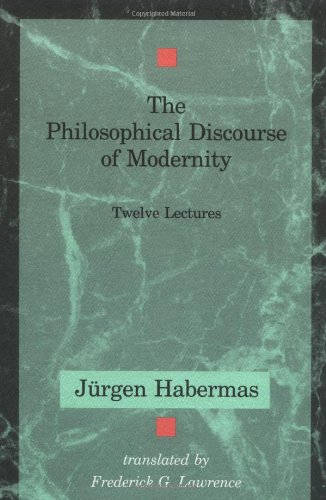The Philosophical Discourse of Modernity book download
Par baker bobbie le mardi, août 9 2016, 22:05 - Lien permanent
The Philosophical Discourse of Modernity. Frederick Lawrence, Jurgen Habermas, Thomas McCarthy

The.Philosophical.Discourse.of.Modernity.pdf
ISBN: 0745608303,9780745608303 | 456 pages | 12 Mb

The Philosophical Discourse of Modernity Frederick Lawrence, Jurgen Habermas, Thomas McCarthy
Publisher: Polity Press
The Philosophical Discourse of Modernity:. This raises more general questions about the differences between a critical social theory and a critical philosophical position, and illuminates the limitations of the latter. For short accounts relevant for the present purpose, see Habermas, Jurgen, The Philosophical Discourse of Modernity, translated by Frederick G. The Philosophical Discourse of Modernity by Jürgen Habermas. Aletheia [unconcealedness; truth] could be the word that offers a hitherto unnoticed hint concerning the essence of esse [to be]. <>The obvious starting point for the analysis of the Habermas – Derrida debate is Habermas' 1987 book The Philosophical Discourse of Modernity in which one 'lecture' and one 'excurses' deal with Derrida. Frederick Lawrence (Cambridge, Mass., 1987), 131. Heidegger has no objection to such a rational framework if it is understood clearly to be a technical means (it is perhaps this distinction that Habermas occults in 'Philosophical Discourse of Modernity'). Thompson | LibraryThing Feminists Read Habermas: Gendering the Subject of Discourse by M. Download Free Novel:Habermas and the Unfinished Project of Modernity: Critical Essays on The Philosophical Discourse of Modernity - Free chm, pdf ebooks rapidshare download, ebook torrents bittorrent download. Specters of Marx is divided into five chapters organized around the central conception of spectrality — that which is not Jürgen Habermas, The Philosophical Discourse of Modernity, transl. It gave me better ways of thinking about modernity and much else besides. Gender and Agency: Reconfiguring the Subject in Feminist and. Jürgen Habermas, 'The Philosophical Discourse of Modernity' (1985).